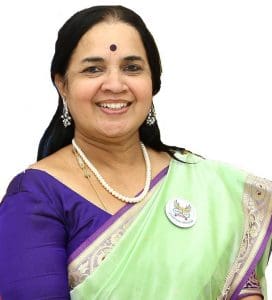By R. Meenakshi
Director – Curriculum (Research and Development) – Vels Group of Schools

The talk being- New Education policy 2020. Schools should either grab it, if not now they’re going to lose it. Few things that fascinated me as a school leader is that the agenda for NEP 2020 offers ways by which the schools can take an initiative in implementing it by various means and at different phases. The School as an entity with its Senior Leadership Team can start making a checklist on :
- How will children learn?
- How the pedagogical structures can be tuned with an emphasis on changing the curricular framework?
- How to link the learning outcomes and competencies based on the revised pedagogical approaches?
- What is the need for teachers’ Continuous Professional Development and how to provide the same?
I think many of the progressive schools are already in line with what NEP 2020 has suggested in its agenda on vision and key principles and how universal access to Early Childhood Education should be given prominence. While implementing the above, how can the schools look at providing a strong Foundation Literacy and Numeracy(FLN) during the foundational and primary years of learning?
Schools can also design their own implementation plans and many schools are already into it. Now it becomes of utmost importance for any established school to devise a strategy that could not only serve its own school’s stakeholders but also go beyond in extending it to a cluster of schools, where there is a need for equipping and developing the skills of teachers in such clusters. The teachers should be helped to develop the core and subject competency skills.
Keeping this in mind, some of the changes that can be brought in immediately is to make the learning in the formative years more transdisciplinary and integrated.
The NEP 2020 very beautifully describes why it is necessary to have arts, crafts and music incorporated in the leanings so as to make it more meaningful and relevant in the real-life context. Of course not to miss out on exposing them to colors, shapes, alphabets and numbers, logical thinking and problem-solving skills!. All this can be achieved through play-based learning, discovery-based learning, teamwork and collaboration.
When the approaches are going to be more engaging, children very actively get into immersive learning, irrespective of the models and approaches selected. I think it should develop a kind of self-identity in a child; a child being able to perform and at the same time realise that there is some Knowledge factor growing up. How this becomes evident in a child? Yes, the child starts Understanding things better, relates himself/herself better with the environment, the entire schema of perceiving things is visible in all his or her expressions.
This develops a curiosity in looking at something with a “WOW “factor. This curiosity is now going to make the child look for some kind of new pattern of learning. So developing “Visible Thinking Routines” helps the child to become independent and lifelong learners. I think the schools can lay a strong emphasis in terms of reducing the curriculum just to its core essence and focus on critical thinking and inquiry-based, discovery, discussion and analysis-based teaching and learning methods for holistic education.
If there are going to be interactive sessions/teaching with reduced redundancy on textbook teaching, there is a strong hope of teaching without textbooks. I strongly feel that that there should be no textbooks prescribed. In order to achieve this, the teacher should be guided to know the curriculum framework with reference to Minimum Learning Levels(MLL) for age-appropriate learning to happen.
If the schools can come out and devise strategies and adopt a pedagogical learning structure, where it can be more fun, creative and collaborative will definitely motivate the child to engage himself in understanding the concepts better.. Focus has to be more on learning objectives and competencies with subject integration, which can be done by the schools themselves. This helps in evolving a structure of learning where the emphasis is given to developing scientific temper.
Integrated and transdisciplinary teaching-learning approaches if advocated from the Foundational years of learning, especially through storytelling-based pedagogy are going to take a stand these days even in a virtual mode of learning. There can be time spent on developing modules in implementing pedagogical plans and outcome-based education by school leaders.
I also strongly advocate a Continuous Professional Development plan devised and executed by school leaders for their team of teachers. Even B.Ed Course has to be revamped; the content has to be reorganized. There cannot be a hard separation of curricular, co-curricular, extracurricular activities. Also bringing in some kind of vocational training within the school academics is an affordable solution by the school itself!
Schools can grab this opportunity to introduce subjects like carpentry, fashion designing, bakery, cooking and making health products and so on. Not to miss out on linking sports, arts, academics, multilingual teaching and digital literacy. I think in a virtual model of learning it becomes a necessity for teachers and students to adopt computational thinking, coding, digital literacy, ethical and moral reasoning. Promoting multilingual teaching helps a lot for the nearby states to hire language teachers. When we talk about innovative pedagogy, transforming the teaching-learning process is very much under the control of school leadership team members. Freedom can be exercised by choosing a variety of subject combinations that are available, I think there should be a scope to help them choose this not only at the school level but also at the college level.
Knowing what the framework of learning is as proposed by the Government or by the examining bodies it is for the school, the school team to develop a teaching-learning approach that needs a total transformation.
One of the basic components of peer tutoring, I think it makes the learning more joyful and it can be a voluntary approach with the senior students teaching the younger children and sometimes the teachers learning from the present generation students on how to operate and handle the tools and apps in a virtual learning mode. And now talking about India‘s leadership roles in many upcoming fields, including contemporary subjects in schools will help the school to indulge design thinking, holistic health, organic living and global citizenship education. The schools need to revive on solving a problem or engaging the children in mathematical thinking through a variety of innovative methods including regular use of puzzles and games. The exam patterns moving away from rote learning, achievement of critical learning objectives and the knowledge of India as a component to be integrated fascinates me in NEP.
I think traditional Indian values and all basic human and constitutional values have to be taught to the children and we can have the handbook made on including the components of knowledge of India. The curriculum can definitely talk about Ancient India to Modern India. Schools can devise and engage the content in such a manner that it caters to some kind of awareness of how rich our culture and heritage are!. Traditional Indian values, excerpts from the Indian constitution, emphasis on general and mental health, good nutrition, disaster response, hygiene, courses in terms of traditional crop cultivation, natural farming can also be made available. ( if there are fields available where the schools are located )into the teaching-learning methodology. Scientific explanations of the detrimental and the damaging effects of alcohol or tobacco all should form a part of the curriculum and students have to be given a logical framework for making ethical decisions at a very young age.
I think if the schools can remember to do all this with the total transformation of the culture of the assessment itself and empowering teachers to have more autonomy in choosing aspects of pedagogy, there can be a huge transformation in the field of Education.
There is also a new term called HEUTAGOGY these days, this is based on what a child wants to learn, and is child-centered. It depends on what the learner wants to learn, how the learner wants to develop his goal-oriented achievements. This being the scenario imagine how equipped and skilled the facilitator has to be to engage such advanced learners in challenging learning situations?!
The schools should employ teachers who have such skill sets to cater to the learning styles and needs of the learners. At least 50 hours of Continuous Professional Development hours can be given over a year to all the teachers. This can be added as an internship or as individual learning for all teachers. Career growth has to be made available for a teacher, for example, if a teacher is within a single school stage, if the teacher has been in the foundational, preparatory, Middle, or Secondary, he/she should be given an opportunity for her to climb up the career growth in terms of teaching the middle school, the secondary school level depending on the competencies acquired.
A technology-based comprehensive teacher requirement planning forecasting exercise has to be conducted by each state and imposed. Also, improve the service environment for a teacher through better infrastructure at schools. This environment has to be more congenial for a teacher to be working very passionately also. I think the schools can decide on providing ample opportunities to get upskilled on the latest pedagogy related to FLN. Continuous Professional Development opportunities will in particular systematically cover the latest pedagogy.
Adult education curriculum can also have the Foundation Literacy Numeracy, critical life skills, vocational skill development, basic education and continuing education. So schools can also provide a wing for educating adults other than children and the premises can be used for people who never had an opportunity to engage in learning during their younger years. In terms of adult education, the school complexes can also lend in fundamental types of programs and schools can definitely make a monetary profit of this also and in turn, they also involve themselves in a Corporate Social Responsibility.
So with the timeline given, schools should not be waiting for the Government to set out the implementation program. If the school leaders and the team can understand those features and agenda of NEP 2020, I think any school would grab it and those that are already promoting this kind of learning in schools can further enhance the areas and the goals that they want to focus on in terms of achieving the Sustainable Development Goals SDG4.


